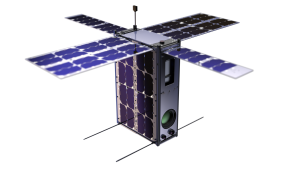Bulgarian Startup EnduroSat: On a Mission to Take Space Commercialization to the Next Level

Even though private space flight is not something new, it is still novel and is becoming increasingly commercial. Being such an exciting prospect, space commercialization is expected to transition the whole space industry from the hands of governments to private enterprises and make it self-sufficient. For a very long time companies have been collaborating with NASA for the design of separate components but the first object in space, which was entirely built by a private company was a communications satellite, launched into orbit back in 1962. Nowadays, satellites are used mainly for Earth imaging and TV broadcasting, as well as to enable telecommunications and navigation systems. With the rapid advancements of technology, however, pioneering companies are now the ones who shape the next era of space exploration and commercialization.
The Bulgarian EnduroSat that engineers, builds, and operates NanoSats, and Momentus, a US-based space startup for building space transportation and infrastructure technology are combining their efforts to enable the commercialization of space. They announced in June 2020 the signing of service agreements for the provision of the transportation of two CubeSats – 6U and 1U CubeSats that will launch on SpaceX Falcon 9 flights next year. Both projects are now moving onto the next phases.
Fast-track to space innovation and commercialization
Recently, EnduroSat also announced its partnership with the South African space technologies engineering startup Hypernova in an agreement to fly the first electric thruster of the startup on its Shared Satellite Mission in Q4/2021, the 6U CubeSat will carry commercial payloads in orbit without any modifications on the satellite platform level. This type of service offers commercial, science, and exploration players to gain access to space operations and data services fast and at a fraction of the current cost – a nanosatellite can be built and launched into orbit for around €500k, while the cost of launching a conventional satellite can be as high as €500m. The service includes everything from integration, validation, and testing, through the launch and operations of the nanosatellite and the payloads, to transmitting the payloads data directly to the cloud.
SPARTAN is the name of the first Shared Satellite mission planned and its launch will be a meaningful step not only for the team of EnduroSat but also for the future development of space missions. “For us as a team, this launch is the culmination of a huge amount of efforts. From a market perspective, the launch will demonstrate our streamlined in-orbit service in action and will open space to customers at an order of magnitude better performance/price. This service is a fast-track to space innovation for visionary commercial, science, and technology teams around the globe,” shares Raycho Raychev, the founder of EnduroSat.
Raychev explains that each satellite today, just like each satellite sixty years ago, is built and engineered for a single mission which means that the satellite bus performs well on a particular mission but a year later the platform has to be re-engineered for a new mission. “EnduroSat’s purpose is to simplify this by providing a flexible, robust, and software-defined satellite platform that can handle multiple payloads on the same mission. With the launch of SPARTAN we hope to demonstrate a new paradigm in the satellite missions design,” says Raychev.

The impact on space startups in the Shared Satellite Service
According to Raychev, space is really challenging and to operate in orbit, most space companies need between three and five years, and even then, the costs and the risks are still high. The satellite value chain is complex, and it involves satellite engineering and assembly, payload integration, building or renting of a ground segment, launch qualification, and testing, launch, in-orbit operations, and many additional activities, including heavy administrative challenges. This has slowed down the innovation in space and many teams don’t have the chance to learn by making mistakes, because they are still too costly. The Shared Satellite Service allows companies to reach orbit fast and without the traditional legal, logistical, and technical complexity. “We are proud to work with customers and help them deploy their breakthrough commercial and technology programs in orbit. Hypernova is a great example of a true innovator at the final frontier. The company has designed a new generation thruster and plans to demonstrate its full performance in orbit via the service,” shares Raychev.
In the short term, EnduroSat expects to help space companies dramatically improve their own services and products by providing them easy and fast access to orbit. While in the long term the Bulgarian Space startup aims to provide a space infrastructure that enables SMEs and research teams to easily join space missions and to become space players. “We want to see many startups succeed at the final frontier and we are putting our best efforts to do so. Our customers and partners are the superheroes and we are there just to support their efforts,” shares Raychev.
The current state of the space sector and the future of EnduroSat
Raychev outlines that right now the space sector is seeing a new wave of consolidations and mergers. Being young SMEs, most players face a challenge to prove the commercial value behind their programs – the time that it takes to prove a technology in space is long and the costs of running a space business are high. Moreover, Raychev highlights that sustainability is becoming increasingly important. On the bright side, according to him the costs of launch and the costs of satellite systems are decreasing, which is expected to empower a new wave of innovation.
When it comes to EnduroSat, Raychev shares that right now they are also focusing on the launch of QMR-KWT CubeSat mission, working in partnership with Orbital Space, a Kuwaiti company for the promotion of space education and technologies. “The QMR-KWT has successfully passed all of its environmental tests but there are always more tests that can be done so we will continue with our automated testing until the launch delivery to ensure the satellite’s stability,” explains Raychev. In the meantime, the Bulgarian space startup is working hard with its partners from Orbital Space to bring additional value to the UAE by extending their services and products in the region. Looking into the future, EnduroSat plans to expand its Shared Satellite Service, grow its business operations, and will soon announce new developments.
+++ Bulgarian Nanosatellite Startup Endurosat Featured in NASA’s State of the Art Report +++




























